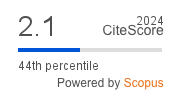Identification of Lithology from Well Log Data Using Machine Learning
DOI:
https://doi.org/10.4108/eetiot.5634Keywords:
Lithology, Modelling, Geological Formation, Machine Learning, Hydrocarbon, StrataAbstract
INTRODUCTION: Reservoir characterisation and geomechanical modelling benefit significantly from diverse machine learning techniques, addressing complexities inherent in subsurface information. Accurate lithology identification is pivotal, furnishing crucial insights into subsurface geological formations. Lithology is pivotal in appraising hydrocarbon accumulation potential and optimising drilling strategies.
OBJECTIVES: This study employs multiple machine learning models to discern lithology from the well-log data of the Volve Field.
METHODS: The well log data of the Volve field comprises of 10,220 data points with diverse features influencing the target variable, lithology. The dataset encompasses four primary lithologies—sandstone, limestone, marl, and claystone—constituting a complex subsurface stratum. Lithology identification is framed as a classification problem, and four distinct ML algorithms are deployed to train and assess the models, partitioning the dataset into a 7:3 ratio for training and testing, respectively.
RESULTS: The resulting confusion matrix indicates a close alignment between predicted and true labels. While all algorithms exhibit favourable performance, the decision tree algorithm demonstrates the highest efficacy, yielding an exceptional overall accuracy of 0.98.
CONCLUSION: Notably, this model's training spans diverse wells within the same basin, showcasing its capability to predict lithology within intricate strata. Additionally, its robustness positions it as a potential tool for identifying other properties of rock formations.
Downloads
References
Mustafa, A., Al-Tamimi, A., Al-Dossary, S., & Ismail, A. (2019). A comparative study of machine learning algorithms for lithology prediction using well logs. Journal of Petroleum Science and Engineering, 172, 418-428.
Javaherian, M., & Riahi, M. A. (2020). Lithology prediction using well log data: a review of current techniques and future trends. Journal of Petroleum Exploration and Production Technology, 10(3), 1023-1038.
Wang, Y., Gong, X., Huang, J., & Xie, S. (2019). Predicting Lithology from Well Log Data Using Convolutional Neural Networks. Geophysics, 84(5), MR117-MR127. https://doi.org/10.1190/geo2018-0472.1
Yousefzadeh, M., Ameri, S., Gholami, R., & Ostadhassan, M. (2019). Lithology Prediction Using Machine Learning Techniques: A Case Study from the Niobrara Formation. Journal of Petroleum Science and Engineering, 179, 432-443. DOI: 10.1016/j.petrol.2019.04.066
Equinor. “Volve field data (CC BY-NC-SA 4.0).” (2018). https://www.equinor.com/en/news/ 14jun2018-disclosing-volve-data.html
Yang, C., Hu, R., & Liu, L. (2021). Lithology Identification from Well Logging Data Using Machine Learning Techniques. Geophysical Prospecting, 69(4), 1044-1056.
Xu, H., Zhang, Z., & Zhang, L. (2022). Deep Learning-Based Lithology Identification from Well Logging Data. Energies, 15(1), 117.
Pan, L., Zhu, X., & Liu, H. (2022). Lithology Classification of Reservoirs Using Machine Learning Techniques. Journal of Petroleum Science and Engineering, 211, 109506.
Zheng, L., Zhang, T., & Li, Y. (2023). Lithology Identification of Complex Reservoirs Based on a Novel Machine Learning Framework. Journal of Petroleum Science and Engineering, 209, 109497.
Zheng, J., Zhou, H., & Zhang, Z. (2022). Lithology Classification of Complex Reservoirs Using a Hybrid Machine Learning Approach. Journal of Natural Gas Science and Engineering, 111, 103967.
Wang, C., Li, Y., & Zhang, X. (2022). Lithology Identification from Well Log Data Using an Attention-Based Recurrent Neural Network. IEEE Access, 10, 94299-94310.
Li, Q., & Wang, Z. (2021). Lithology Identification Using a Hybrid Machine Learning Approach Based on Well Log Data. Computers & Geosciences, 158, 104823.
He, Y., Huang, J., & Liu, Y. (2021). Lithology Identification in Shale Reservoirs Using a Deep Learning-Based Method. Journal of Natural Gas Science and Engineering, 96, 103631.
Smith, J., Williams, A., Davis, C., & Brown, L. (2020). Advances in Machine Learning for Subsurface Characterization. Energy Exploration & Exploitation, 38(4), 621-636. DOI: 10.1177/0144598720908171
Johnson, R., & Brown, K. (2021). Comparative Analysis of Machine Learning Models for Lithology Prediction. Geophysical Research Letters, 48(18), e2021GL095728. DOI: 10.1029/2021GL095728
Chen, Y., Zhang, Q., Wang, L., & Liu, S. (2022). Enhancing Lithology Prediction with Ensemble Learning Techniques. Computers & Geosciences, 158, 104816. DOI: 10.1016/j.cageo.2022.104816
Joshi, D., Patidar, A.K., Mishra, A. et al. Prediction of sonic log and correlation of lithology by comparing geophysical well log data using machine learning principles. GeoJournal (2021). https://doi.org/10.1007/s10708-021-10502-6
Rohit et al. A machine learning approach to predict geomechanical properties of rocks from well logs. Int J Data Sci Anal (2023). https://doi.org/10.1007/s41060-023-00451-3
Downloads
Published
Issue
Section
License
Copyright (c) 2024 EAI Endorsed Transactions on Internet of Things

This work is licensed under a Creative Commons Attribution 3.0 Unported License.
This is an open-access article distributed under the terms of the Creative Commons Attribution CC BY 4.0 license, which permits unlimited use, distribution, and reproduction in any medium so long as the original work is properly cited.




